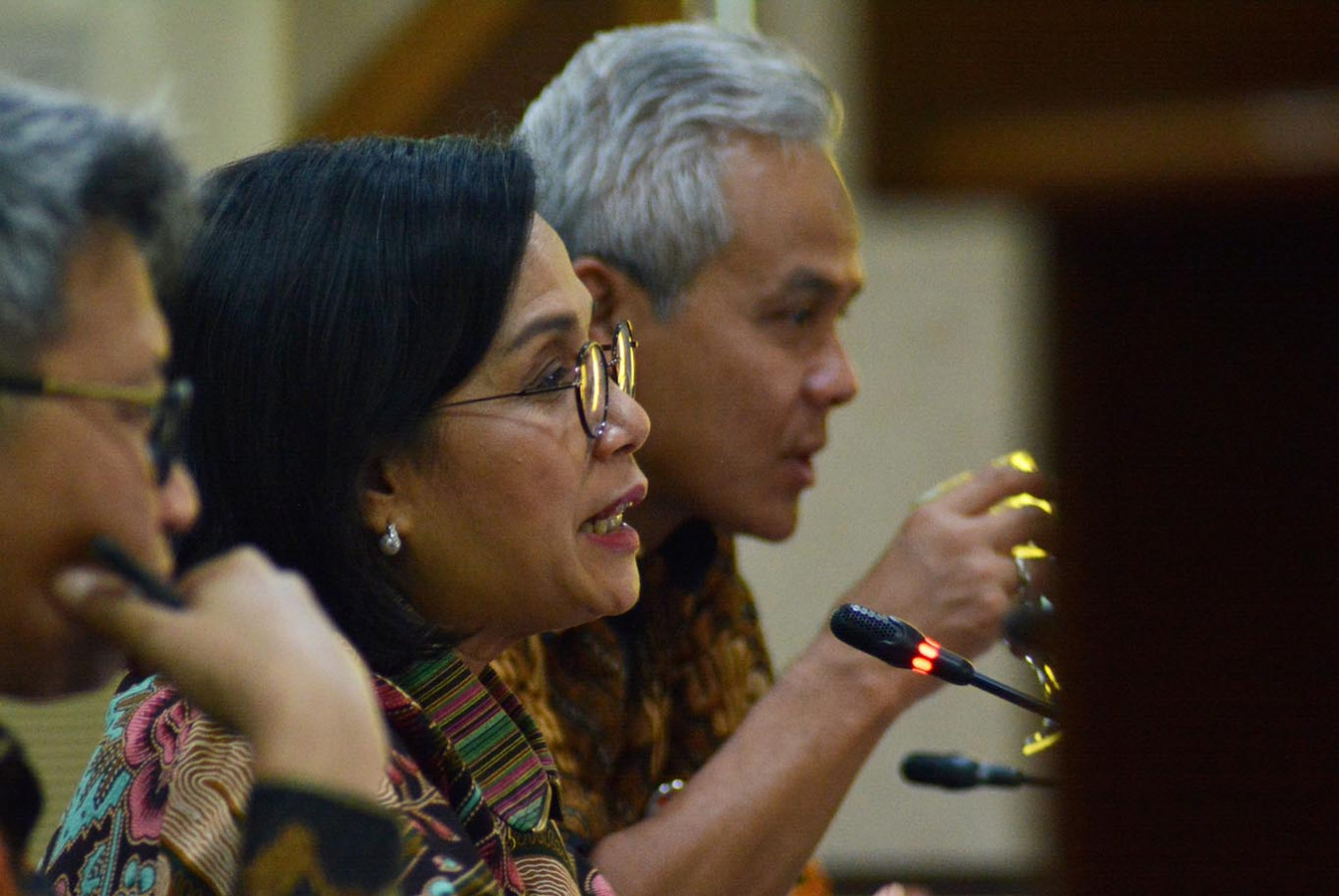Popular Reads
Top Results
Can't find what you're looking for?
View all search resultsPopular Reads
Top Results
Can't find what you're looking for?
View all search resultsGovernment open to possibility of BI buying zero-coupon bonds to aid state budget
Finance Minister Sri Mulyani Indrawati said the central bank might bear 100 percent of the coupon rate burden for bonds issued to finance programs that were considered in the public interest.
Change text size
Gift Premium Articles
to Anyone
 Finance Minister Sri Mulyani Indrawati (center). The government has opened the possibility of Bank Indonesia (BI) buying government bonds with a zero-coupon rate as part of a “burden-sharing” scheme to finance the battle against the COVID-19 pandemic, a senior minister said on Monday. (Antara/R. Rekotomo)
Finance Minister Sri Mulyani Indrawati (center). The government has opened the possibility of Bank Indonesia (BI) buying government bonds with a zero-coupon rate as part of a “burden-sharing” scheme to finance the battle against the COVID-19 pandemic, a senior minister said on Monday. (Antara/R. Rekotomo)
T
he government has opened the possibility of Bank Indonesia (BI) buying government bonds with a zero-coupon rate as part of a “burden-sharing” scheme to finance the battle against the COVID-19 pandemic, a senior minister said on Monday.
Finance Minister Sri Mulyani Indrawati said the central bank might bear 100 percent of the coupon rate burden for bonds issued to finance programs that were considered in the public interest, including for health care, social protection and financial support for regional governments. She expected the programs to amount to Rp 397 trillion (US$28 billion).
“We are currently finalizing with the central bank how many government bonds we will sell to the market and how many we’ll sell through private placement to BI,” Sri Mulyani told lawmakers during a hearing on Monday.
Earlier this month, she stressed that zero-coupon bonds were not among instruments being discussed by the government and the central bank to be used to step up the country’s response to the pandemic, despite urging by lawmakers.
The government has been struggling to finance the widening budget deficit, which is expected to reach 6.34 percent of gross domestic product (GDP), much higher than the previous legal limit of 3 percent. An emergency law signed by President Joko “Jokowi” Widodo in April gave a legal basis for the government to widen the deficit beyond the 3 percent limit.
The government has now allocated Rp 2.74 quadrillion in state spending while state revenue is expected to amount to only Rp 1.7 quadrillion, according to the latest 2020 state budget revision as stated in Presidential Regulation (Perpres) No. 72/2020 signed last week.
The government has allocated Rp 695.2 trillion worth of COVID-19 related expenditure to fund health care and boost the economic recovery. Sri Mulyani said on Monday the pandemic would force the government to spend around Rp 903.46 trillion, comprising Rp 505 trillion for public-welfare programs and Rp 397 trillion in support for the private sector, from the state budget.
The minister said on Monday the central bank might also finance support programs for businesses and individuals, by buying bonds with a coupon rate of 1 percent below BI’s benchmark interest rate, which currently stands at 4.25 percent.
According to the ministry’s official material presented to the lawmakers, the interest rate burden from government bonds caused by the pandemic will be Rp 66.5 trillion per year, with a yield assumption of 7.36 percent for the 10-year government bonds at the time. BI might bear Rp 35.9 trillion of the total burden, according to the finance minister.
BI Governor Perry Warjiyo said the central bank and the government were in the final stages of the burden-sharing scheme, adding that it would maintain good-governance principles.
“BI is ready to share the burden not only in the financing efforts but also those related to the debts,” Perry told lawmakers during the same hearing, adding that the scheme would ease the government’s burden from paying higher interest rates as a result of the widening deficit.
The central bank has bought Rp 30.33 trillion of government bonds directly in auctions as a non-competitive bidder to help finance the budget deficit. It has also bought Rp 166.2 trillion of bonds in the secondary market to help stabilize the country’s currency.
Previously, several lawmakers had called on BI to do more to share the government’s burden, urging the central bank to buy bonds with zero-coupon rates.
“The burden-sharing scheme will help maintain debt stability and market confidence,” Permata Bank economist Josua Pardede said on Monday, adding that it would also lower the government’s burden amid the widening deficit and rising debt-to-GDP ratio.
“This will also prevent interest payments from becoming too high, which will be a subject of evaluation by credit-rating agencies,” Josua said, warning that the agencies might downgrade the country’s rating if interest payments were higher than tax revenue.
The government, he went on to say, should speed up government spending in a bid to bolster the economy, warning that slow fund disbursement might also hinder the economic recovery.
Meanwhile, Center of Reform on Economics (CORE) Indonesia research director Piter Abdullah described the agreement as “too extreme” given the significant difference between the market rate of around 7 percent and the zero percent rate.
“Although there are no notable risks, they should also have an agreement that if the central bank’s capital declines, the government should step in and inject liquidity."









